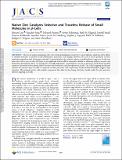Native Zinc Catalyzes Selective and Traceless Release of Small Molecules in β-Cells
Author(s)
Goldberg, Jacob Michael; Lippard, Stephen J.
DownloadPublished version (1.439Mb)
Publisher with Creative Commons License
Publisher with Creative Commons License
Creative Commons Attribution
Terms of use
Metadata
Show full item recordAbstract
Copyright © 2020 American Chemical Society. The loss of insulin-producing β-cells is the central pathological event in type 1 and 2 diabetes, which has led to efforts to identify molecules to promote β-cell proliferation, protection, and imaging. However, the lack of β-cell specificity of these molecules jeopardizes their therapeutic potential. A general platform for selective release of small-molecule cargoes in β-cells over other islet cells ex vivo or other cell-types in an organismal context will be immensely valuable in advancing diabetes research and therapeutic development. Here, we leverage the unusually high Zn(II) concentration in β-cells to develop a Zn(II)-based prodrug system to selectively and tracelessly deliver bioactive small molecules and fluorophores to β-cells. The Zn(II)-targeting mechanism enriches the inactive cargo in β-cells as compared to other pancreatic cells; importantly, Zn(II)-mediated hydrolysis triggers cargo activation. This prodrug system, with modular components that allow for fine-tuning selectivity, should enable the safer and more effective targeting of β-cells.
Date issued
2020-03Department
Massachusetts Institute of Technology. Department of ChemistryJournal
Journal of the American Chemical Society
Publisher
American Chemical Society (ACS)
Citation
Lee, Miseon et al. “Native Zinc Catalyzes Selective and Traceless Release of Small Molecules in β-Cells.” Journal of the American Chemical Society 142 (2020): 6477-6482 © 2020 The Author(s)
Version: Final published version
ISSN
0002-7863